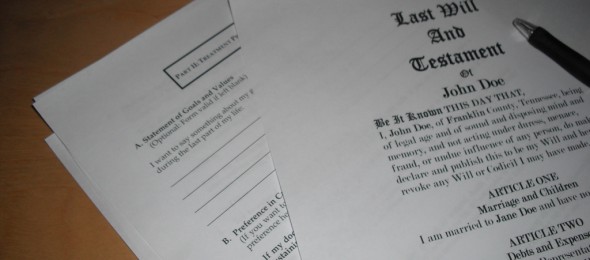E. Gary Spitko, Professor of Law at the Santa Clara University School of Law has published an interesting article entitled, “The Will as an Implied Unilateral Arbitration Contract,” Florida Law Review, Forthcoming; Santa Clara Univ. Legal Studies Research Paper No. 6-15. In his paper, Professor Spitko argues that provisions which require any challenges related to an individual’s last will and testament be arbitrated should be upheld as an “implied unilateral contract between the testator and the state.”
Here is the abstract:
A consensus has begun to develop in the case law, the academic commentary, and the statutory reform movement that a testator’s provision in her will mandating arbitration of any challenge to the will should not be enforceable against a beneficiary who has not agreed to the arbitration provision, at least where the will contestant, by her contest, seeks to increase her inheritance outside the will. Grounding this consensus is the widespread understanding that a will is not a contract. This Article seeks to challenge both the understanding that the will is not a contract and the opposition to enforcement of testator-compelled arbitration provisions that arises from that understanding.
This Article argues that the will is part of an implied unilateral contract between the testator and the state in which the state offers to honor the testator’s donative intent and the testator accepts and provides consideration for the offer by creating and preserving wealth. Importantly, the greater contract respecting donative freedom of which the will is a part also includes a provision providing for the distribution of an individual’s intestate property in line with that individual’s imputed intent should the individual fail to execute an effective estate plan. Similar to the testator, the property owner who has failed to make an effective estate plan accepts this offer of intestate distribution through her industry and thrift. This Article’s theory borrows from the law respecting implied unilateral contracts arising from employee handbooks in concluding that it should be of no moment that the property owner is unfamiliar with the specifics of the state probate code. Rather, the critical factor should be that the state has, through its offer to respect donative intent, created an atmosphere that is “instinct with an obligation” and that encourages diligence and the prudent management of wealth.
The conclusion that the will is a contract between the testator and the state grounds this Article’s additional argument that the Federal Arbitration Act and state arbitration statutes require enforcement of a testator-compelled arbitration provision contained in a will even against a beneficiary who has not agreed to the arbitration provision. Settled arbitration law in conjunction with third-party beneficiary theory or direct benefits estoppel theory supports binding the beneficiary to the will’s arbitration contract. A virtue of this Article’s theory that the will and the intestacy statute are both clauses in a greater donative freedom contract is that the analysis escapes the limitations inherent in the dominant understanding that a will’s arbitration clause, if enforceable at all, can be enforced only against a beneficiary who seeks by her will contest to increase her inheritance under the will as opposed to circumstances in which the donee seeks to increase her intestate inheritance. According to the conventional wisdom, even if arbitration clauses are enforceable in some testamentary instruments, they govern only a narrow range of claims. This Article’s implied unilateral contract theory goes further and expands the universe of arbitrable contests. Specifically, this Article’s theory is the first theory that encompasses even a will contest that seeks to render the will a complete nullity.
This and other scholarly articles written by Professor Spitko may be downloaded for free from the Social Science Research Network.
Photo credit: Ken_Mayer / Foter / CC BY














